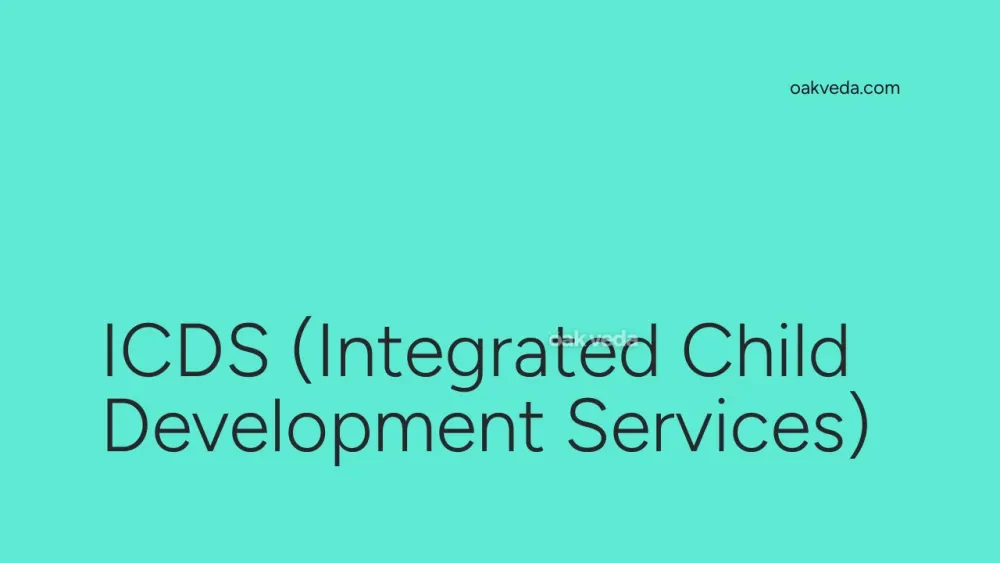
What is the Full Form of ICDS?
ICDS is the abbreviation for Integrated Child Development Services. This comprehensive program is a flagship initiative of the Indian government aimed at promoting the health, nutrition, and overall well-being of children under six years of age, as well as pregnant women and lactating mothers.
What is Integrated Child Development Services?
Integrated Child Development Services is a holistic welfare scheme designed to address the multifaceted needs of young children and their mothers in India. Launched in 1975, ICDS provides a package of services that includes supplementary nutrition, immunization, health check-ups, referral services, pre-school education, and health and nutrition education for mothers.
Origin and Development of ICDS
The ICDS program was initially introduced in 1975 as part of India's efforts to combat child malnutrition and improve maternal health. However, the scheme faced a brief setback when it was withdrawn in 1978 by the Morarji Desai government. Recognizing its importance, the program was later reinstated and gained significant momentum during the Tenth Five-Year Plan (2002-2007).
Since its reintroduction, ICDS has evolved into one of the world's largest integrated early childhood care and development programs, reaching millions of beneficiaries across India.
How does ICDS work?
ICDS operates through a network of Anganwadi centers, which serve as the primary point of service delivery at the community level. These centers are staffed by trained workers who implement various components of the program. The scheme works in coordination with other government departments, such as Health and Family Welfare, to ensure comprehensive service delivery.
Functions of ICDS
The ICDS program encompasses several key functions:
- Supplementary Nutrition: Providing additional food to bridge nutritional gaps for children, pregnant women, and lactating mothers.
- Immunization: Ensuring complete immunization coverage for children and expectant mothers.
- Health Check-ups: Regular health monitoring and early detection of health issues.
- Referral Services: Connecting beneficiaries with appropriate healthcare facilities when needed.
- Pre-school Education: Offering non-formal education to children aged 3-6 years.
- Health and Nutrition Education: Educating mothers about proper nutrition, childcare, and health practices.
Applications of ICDS
The ICDS program has wide-ranging applications in addressing various aspects of child and maternal welfare:
- Malnutrition Prevention: By providing supplementary nutrition and educating mothers, ICDS helps combat malnutrition among children.
- Early Childhood Education: The pre-school component prepares children for formal schooling, enhancing their cognitive development.
- Maternal Care: ICDS supports pregnant women and new mothers, ensuring better health outcomes for both mother and child.
- Community Health: Through its various services, ICDS contributes to overall community health improvement.
Features of ICDS
Key features of the Integrated Child Development Services include:
- Universal Access: ICDS aims to reach all eligible beneficiaries, regardless of their socio-economic status.
- Integrated Approach: The program combines various services to address multiple aspects of child and maternal welfare.
- Community-based Implementation: Anganwadi centers are set up within communities for easy access and better outreach.
- Focus on Early Intervention: By targeting children under six and pregnant women, ICDS emphasizes early intervention for better long-term outcomes.
- Continuous Monitoring: Regular health check-ups and growth monitoring help track progress and identify issues early.
Benefits of ICDS
The ICDS program offers numerous benefits:
- Improved Child Health: Regular health check-ups and immunizations lead to better overall health outcomes for children.
- Enhanced Nutrition: Supplementary nutrition helps combat malnutrition and promotes healthy growth.
- Better School Readiness: Pre-school education prepares children for formal schooling, potentially reducing dropout rates.
- Empowered Mothers: Health and nutrition education empowers mothers to make informed decisions about childcare.
- Reduced Infant Mortality: Through various interventions, ICDS contributes to lowering infant mortality rates.
Limitations or Challenges of ICDS
Despite its successes, ICDS faces several challenges:
- Infrastructure Gaps: Many Anganwadi centers lack proper facilities and equipment.
- Quality of Services: Inconsistent quality of services across different regions remains a concern.
- Human Resource Issues: Shortage of trained staff and high workload for Anganwadi workers affect service delivery.
- Monitoring and Evaluation: Effective monitoring of the program's implementation and impact is challenging due to its vast scale.
- Funding Constraints: Inadequate funding affects the program's ability to reach all intended beneficiaries.
Future Developments in ICDS
The future of ICDS looks promising with several planned developments:
- Digital Integration: Implementing technology for better monitoring and data management.
- Capacity Building: Enhancing training programs for Anganwadi workers to improve service quality.
- Convergence with Other Schemes: Strengthening linkages with other government programs for more comprehensive support.
- Focus on Early Childhood Education: Expanding and improving the pre-school education component.
- Nutrition-specific Interventions: Developing targeted interventions to address specific nutritional deficiencies.
FAQs on ICDS Full Form
-
What age group does ICDS cater to? ICDS primarily focuses on children under 6 years of age, pregnant women, and lactating mothers.
-
Is ICDS available throughout India? Yes, ICDS is a nationwide program implemented across all states and union territories of India.
-
How can one access ICDS services? ICDS services can be accessed through local Anganwadi centers in your community.
-
Are ICDS services free of cost? Yes, all services provided under the ICDS program are free of charge for eligible beneficiaries.
-
Can urban areas benefit from ICDS? Yes, ICDS operates in both rural and urban areas, with a special focus on underserved urban populations.
In conclusion, the Integrated Child Development Services (ICDS) plays a crucial role in promoting child and maternal welfare in India. By addressing multiple aspects of early childhood development and maternal health, ICDS contributes significantly to building a healthier and more prosperous future for the nation.
You may be interested in:

